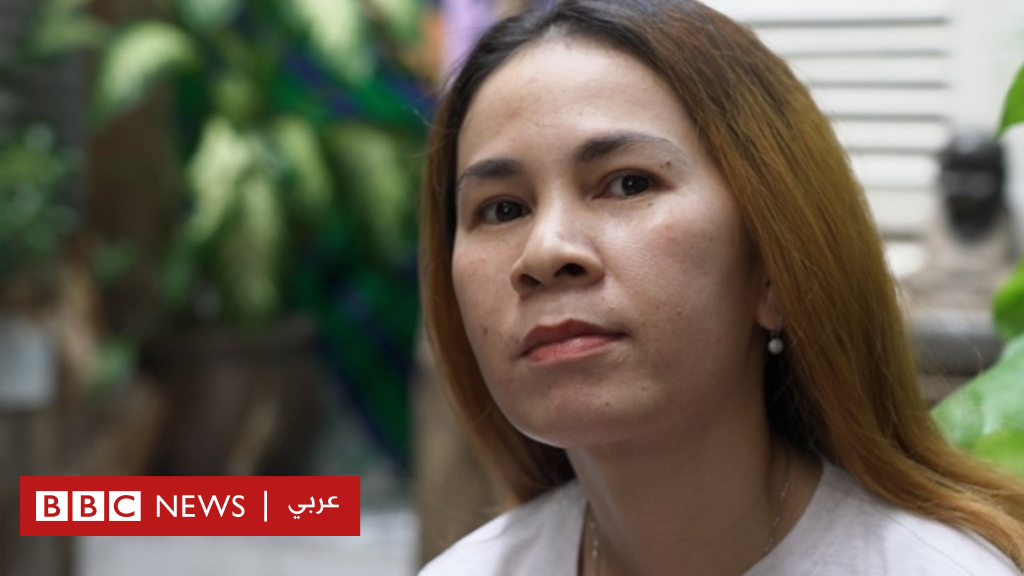- Stefania Hegarty
- BBC Population Correspondent
Jiang began communicating more with his family during the outbreak
According to the World Health Organization, a global survey commissioned by the BBC highlights the deep and diverse impact of the coronavirus pandemic on mental health. A surprising number of people surveyed in 30 countries report feeling better now than before the pandemic. The survey also indicates that the impact of the epidemic on psychological and mental health is more pronounced in women and young people.
Nguyen Thanh Giang is on the phone with her father as she walks through her garden and seems eager to show her the mango trees. He is happy to communicate with her daughter that she lives 400 km in Ho Chi Minh City.
Before closing, Jiang was busy running her own printing press and raising her teenage son, she rarely called her family, and they could go two or three years without seeing her parents.
“We haven’t had a great relationship in the past, but after the pandemic I realized I needed to get in touch with them more,” he says.
“It really makes me feel like I’m not alone.”
The survey, prepared by GlobeScan, commissioned by the BBC World Service, shows that 36% of people around the world said they felt better than before the outbreak, while 27% said they believed their condition had worsened.
Many also said that spending more time with their family and connecting with their community and nature had a positive effect and they felt their overall priorities in life were clearer in their minds.
Most residents of Vietnam, India, Egypt and Nigeria said they felt better, while in Japan, South Korea and Hong Kong respondents said the opposite.
In the UK, the number of people who said they felt worse than before the pandemic slightly exceeded the number of people who said they felt better, while in the US it was the other way around. In seven other European countries, the impact of the epidemic period was negative on the population.
The survey was conducted online in June and July of this year and involved over 29,000 people.
A WHO spokesperson said: “GlobeScan results show that the outbreak has had a profound impact on the mental health of many … Of course, this impact was not the same, but varied and varied across population groups. “.
Like many young mothers, Tran Nguyen Kim Nan struggled during the fourth and toughest blockade in Ho Chi Minh City, Vietnam, which began in June last year.
Tran had just started a new job and had a one year old daughter: “It was so stressful that to find time for myself I would go to the bathroom and stay there for a few minutes … I take a deep breath and go back to my days”, He says.
In nearly all of the countries surveyed, women reported a more negative impact of the pandemic on their mental health than men.
But the same factors that were causing Tran’s stress at the time are helping her feel better.
The survey also found that parents living with children under the age of 18 were more likely to say their mental health is better than it was before the outbreak, than others.
“I think recovery was easy for me because I was so busy with the details and tasks of my daily life, with my job and my son,” says Tran.
The past couple of years have also seen some major changes in Tran’s life. A major company sought a new job, she bought an apartment with her husband, adopted a cat and even started learning Japanese.
“I think I got braver and bolder after the pandemic,” she says. “If I want to do something, I do it immediately without delay or delay.”
Tran says she became braver and bolder after the outbreak
But there were areas where men and women had much more in common after the pandemic, such as a greater sense of community and connection.
Andrew Oswald, a professor of economics and behavioral sciences at the University of Warwick in the UK, cautions against overly analyzing what people say about how they have felt in the past.
“What we do know is that there is a kind of persistent present-oriented optimism, which means that people look back and erroneously tend to think that things were worse then and that they are happier now,” he says. of in-depth research comparing people’s remembered levels of happiness with actual levels of happiness measured at that time.
But he says the findings on gender are consistent with his research.
The World Happiness Report, which uses Gallup survey data collected over the past 10 years in 150 countries, indicates a long-term upward trend in levels of stress, anxiety and sadness in most countries and a slight decrease in enjoyment of life. life.
There has also been a global increase in the percentage of people who claimed to have donated money to charities, helped strangers, and volunteered.
Vietnam moved up two places on the global happiness chart this year.
At Ho Chi Minh City University of Social Sciences, therapist Trin Tan Feh noticed a significant improvement in her clients’ mental health last year and is working on a program called “brain vaccine” that started during the pandemic.
It started with a mental health hotline that provided support to people during last year’s lockdown, as the city saw a sharp rise in anxiety and suicidal thoughts. Many were also experiencing grief and a sense of loss, especially as three-quarters of the coronavirus deaths in Vietnam were in this city.
Globally, one-third of people surveyed said they lost a loved one during the pandemic and 56% said the deaths occurred as a result of the pandemic.
But Trin Tan sees a silver lining in all of this – he believes the past year has helped raise mental health awareness in Vietnam: “Now people know where to look for help when they have mental health problems … when they have anxiety or seizures. ” Panic, they know where to go “.
He also found that during the rigid blockade of the city, people came together and united to provide food and support each other.
“This belief in kindness and civility has helped people defeat the pandemic,” he says. “On Vaccine for the Mind, there were a lot of people who decided to come and volunteer … After the pandemic, I realized that the list of people on my phone was incredibly long.”
The Globescan survey indicates that the impact of the outbreak varies between generations.
Dang Quang Deng started getting annoying messages from his readers
When Vietnam went into lockdown, Dang Quang Deng, author of the popular comic magazine Meo Moc, began receiving disturbing messages from his readers.
Dang’s comics are personal journals of his daily life, his experiences of studying abroad, personal loss and imprisonment, in which he appears as a black cat. Dang shares his experiences and daily life with his readers, which encourages them to share their experiences with him.
“There were a lot of disturbing messages about trauma, PTSD and things like that,” explains her partner, Wendy Truong. “Most of the messages that people were young”.
Together, they decided to start a new illustrated magazine focusing on mental health and offering advice from professionals.
In his research in the UK, Professor Andrew Oswald found that young people are the most affected in terms of mental health, while the elderly are the least affected.
The Globescan survey showed that the majority of young people between the ages of 18 and 24 said the pandemic had a significant impact on their mental health, both positively and negatively.
This can be an indication of the level of awareness or awareness of the importance of mental health.
“My dad is a doctor but he doesn’t realize that mental health is a real problem,” says Wendy. “Opinions in Vietnam are very divided on the issue of mental health.”
Wendy adds that the young people she knows take better care of themselves than ever, communicate via teleconference, check on each other more regularly, or take yoga and meditation classes.
Others who seem to have benefited the most are high-income workers and people living in cities.
This makes sense for Wendy, in a country where young people, who have office jobs, live in urban areas.
“We didn’t suffer much damage, at least financially, because we could have stayed home and worked, but I don’t think that’s the case for everyone. Especially the older people who had to work in the factories,” he says.
“I think it’s a lot easier for millennials.”
A spokesperson for the World Health Organization said the survey results confirmed the need for further research into the impact of the epidemic on mental health among specific groups of the population at risk. The spokesperson noted that mental health services were particularly disrupted during the pandemic and that this exacerbated the problem.
“Future studies should therefore focus on expanding mental health and psychosocial support services as an essential component of preparedness and response plans for future public health emergencies.”
Additional reporting by Sarah Habershon


